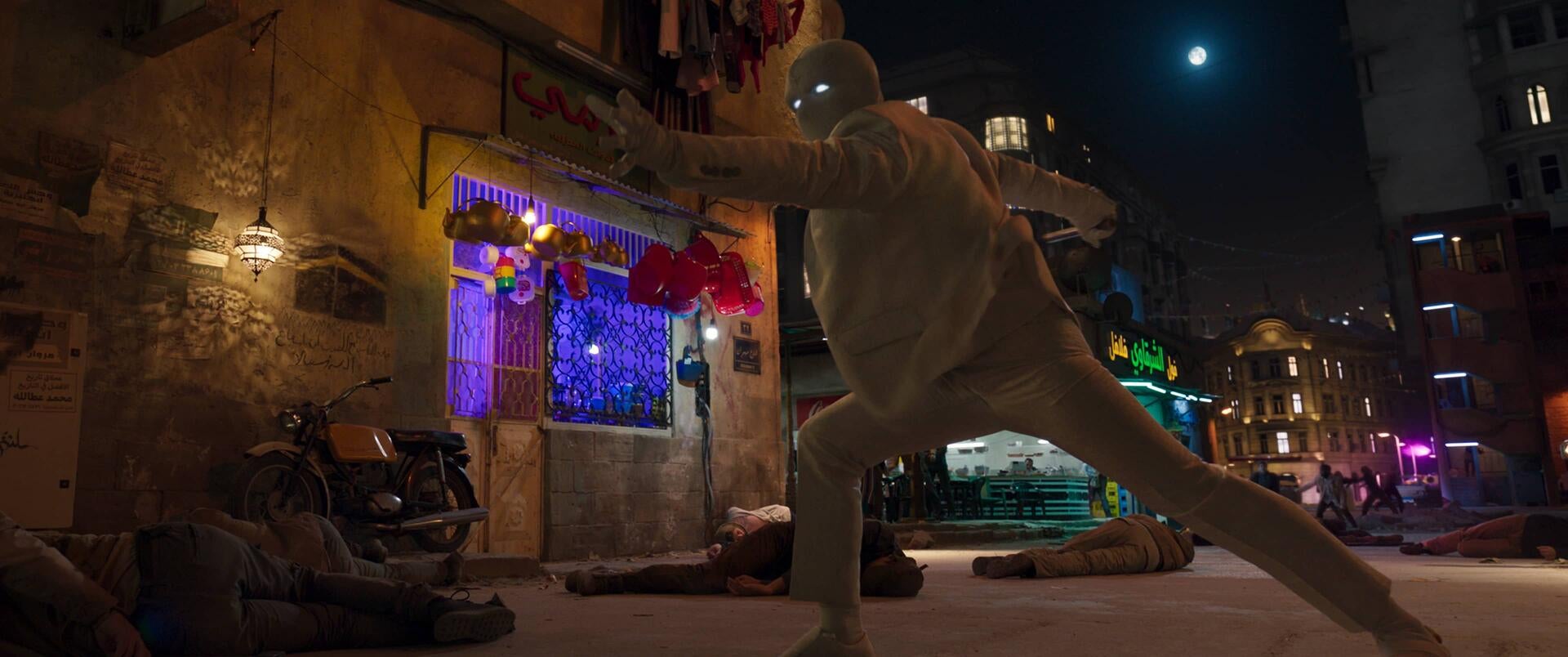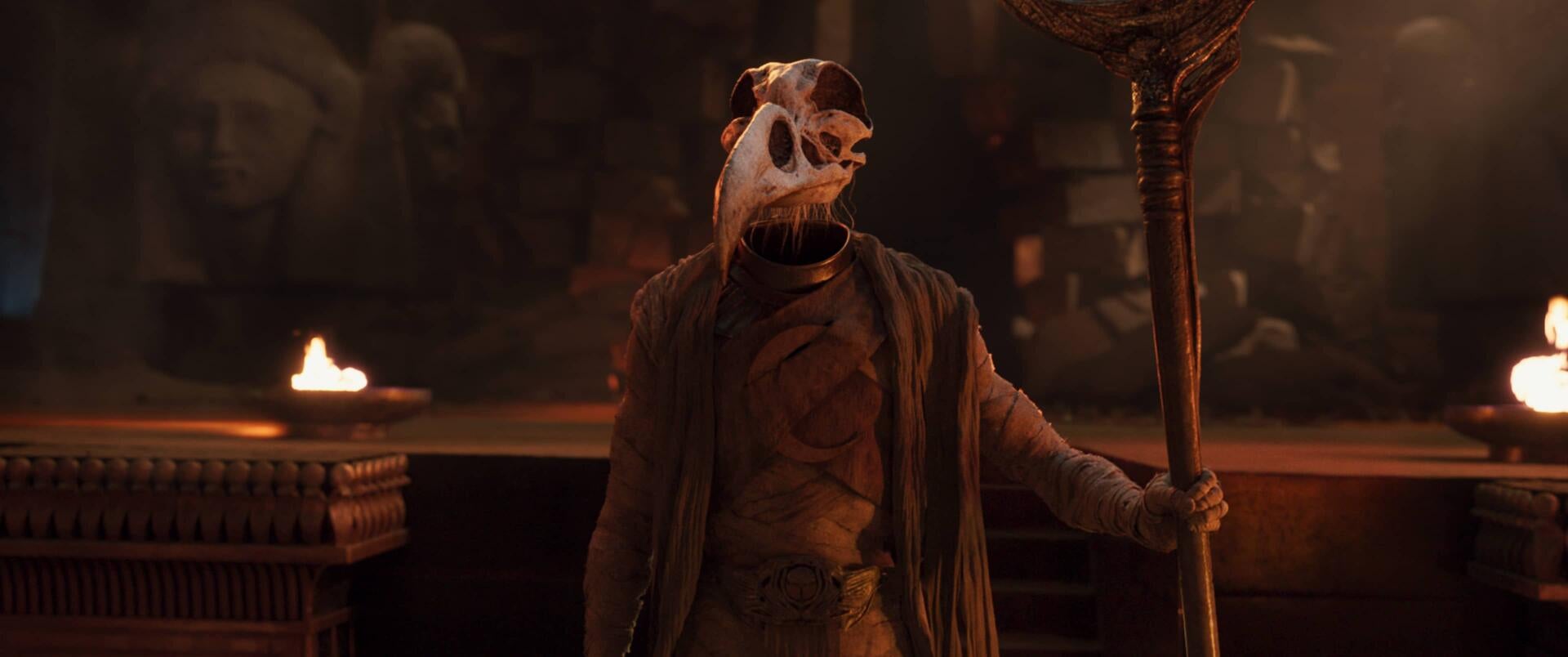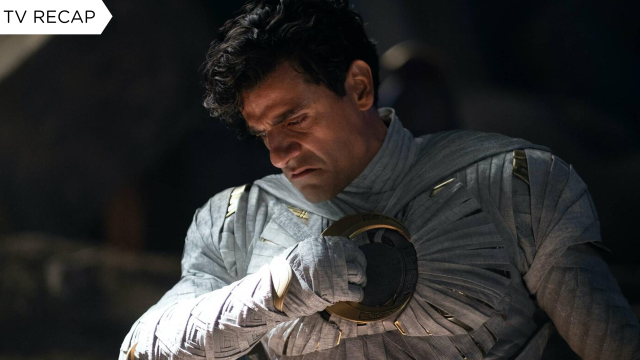Moon Knight has had a stranger story than most Marvel projects to track over its six episodes — at first, starting out as something of a peculiar character piece more akin to the early days of Marvel’s own Netflix adventures with Daredevil than the blockbuster, cameo-laden action we tend to expect from the studio now. Now as the book is closed on its finale, the series headed down that latter path a little later than most Marvel series do… and for the most part, it worked in its favour.

“Gods and Monsters,” the sixth — and, a certain end credits sequence aside, perhaps final — episode of Moon Knight, shares a lot in common with most final acts in the mighty Marvel manner, for better or worse. The character work of the past is brushed aside for big punch-up fight sequences, there’s very little in the way of actual plot because of it, of course there’s a lot of people reacting to big CG setpieces, and, the most beloved superhero climax of all, a Mysterious Glowing Light to act as a beacon for our and our hero’s attentions during all that aforementioned punching.
That is perhaps a bit dismissive, admittedly — but as predictable as this kind of formula has become for Marvel (and frankly, much superhero material) in recent years, Moon Knight takes something of a relish in being finally able to embrace it after five episodes of Oscar Isaac having existential conversations with, well, himself. If anything, having those five episodes of introspection with all three of the series’ major characters — Mark, Steven (who gets very quickly brought back after his equally quick “death” last week), and in particular Layla — is what makes Moon Knight going for those typical superhero setpieces shine instead of stumble. It makes sense that Mark, having reconciled the trauma of how he developed DID and the regrets of his past, gets to embrace the importance of Steven as part of himself, and in doing so, gets to unleash as Moon Knight with a confidence and even joy he’s never shown in the series so far — rocketing towards Cairo for an explosive showdown with Harrow and a larger-than-life revived Ammit, who descends on the city to render her glowy purple judgment. It’s even made even better with some truly fun camera work that shows Mark and Steven as a cohesive fighting team, flitting between their different takes on the avatar form to carve an elegant path through Harrow’s goons and eventually to the man himself.

It’s made even better that he’s doing so alongside Layla, who, it turns out, decides to become an avatar herself — not of Khonshu, but to Taweret, netting herself an extremely nifty winged supersuit and fancy swords (why does the avatar of a fertility goddess need twin swords? Especially as, apparently, a riff on the ultra-obscure Invaders-era comics character, the Scarlet Scarab? Not sure, but roll with it, it rules). It’s an evolution for the character that is both really fun — May Calamawy gets to kick a wonderful amount of arse in the big fight of the episode, and is clearly having a lot of fun — and embodies a decision that she and she alone makes. It’s reflective of the struggles she’s faced throughout the series about people trying to decide what her path should be, whether it’s Harrow trying to turn her against Marc for his role in her father’s death, or Marc himself pushing her away in his darkness as he fears for Khonshu trying to claim her as his descendant as Moon Knight. The culmination of that arc, one of the series’ most compelling, being that she gets to be her own kind of superhero might be a little rote, sure — but once again, it works enough with the context of her arc, and is just too damn fun, for that to be a real complaint.
If anything the only real downside of all this spectacle in “Gods and Monsters” are the titular gods, Ammit and Khonshu. The latter is freed by Layla in a desperate attempt to both stop Ammit and bring Marc back from the dead, and the duo spend most of their time in the episode as giant-sized CG versions of themselves left to duke it out in the background while we focus on Marc, Layla, and Harrow fighting each other. It feels… kind of pointless, and like there was somehow not enough justification for a final-episode threat beyond “literally the population of Cairo is having its souls sucked out” that we needed a larger-than-life smackdown that is weightless, all too brief, and just nowhere near as fun as the stuff on the ground with Moon Knight’s actual heroes and villain. Thankfully, it is brief, and once Marc blacks out to save Layla and defeat Harrow once and for all (again… more on that later), it feels like Moon Knight has come to a satisfying end, at least. The fight’s won, the day saved, and both Marc and Layla alike are at peace with themselves enough to call it a day — the former in particular, relinquishing his position as Khonshu’s avatar.

… Well, sort of. Where Moon Knight’s finale gets a little muddy is after this happy ending, where we leave Marc and Steven back in London, back in Steven’s old life of a run-down flat and ankle bracers on beds, but they have, at least, each other, and a kind of assuredness that comes with the strength of their bond. The episode itself may end there, but this is, of course, a Marvel story — and if big CG-laden fighty third acts are inevitable, so is the post-credit scene, and Moon Knight’s is a bit of a doozy. Flashing us back to a psychiatric facility that now Harrow — his body a vessel for Ammit after Marc and Layla’s ritual — is housed in, the man finds himself mysteriously hauled out of the hospital and into an elaborate limo, only to find Khonshu inside and his new avatar…
Oscar Isaac. Not as Marc, not as Steven, but the third, apparently more brutal persona teased in the Cairo fight earlier: Jake Lockley, who promptly murders Harrow in cold blood and Khonshu’s vengeful name. Lockley has history in the comics of course, a New York taxi driver who acts as Marc’s persona for street-level investigations and intelligence gathering. Including him at last as Moon Knight ends, however, is a bit of an odd thing. Naturally, it leaves things open for more Moon Knight stories to tell, even if, at least, we know for now that Oscar Isaac has yet to sign up for more (admittedly in this era of franchises, perhaps a bit of a naive thought) — but there’s just something a little jarring that Moon Knight ends on this touch of darkness after the fun and satisfaction of “Gods and Monsters” and its main arc.

Before this scene, the show ends with the dramatic catharsis of Marc choosing not to murder Harrow and Ammit, a rejection of Khonshu’s mind games and a truly heroic moment, giving up his power to be the person that he wants to be, with Steven and Layla metaphorically (literally too, in the latter’s case) by his side in support. The “gotcha” reveal that another of his personalities has decided to eschew that powerful choice and remain at Khonshu’s side, presumably with Marc and Steven currently unaware of that violation of their own choice, is fascinating! But it’s also just quite jarring, too, and doesn’t quite fit the satisfying tone of the rest of the finale.
How that story plays out, of course, remains to be seen — and any current jarring feeling in the moment might be relieved as we get to explore whatever Jake’s story is in future tales. But for now, this is how Moon Knight ends, perhaps much in the way it has been these past six weeks: some parts satisfying, some parts not, and a strangely balanced path between the allure of the Marvel superhero formula and something a bit deeper and introspective. We may not be sure if we’re putting the show on Tawaret’s scales to send it into the Duat just yet, but overall, it struck that balance pretty well in the end.
Want more Gizmodo news? Check out when to expect the latest Marvel and Star Wars releases, what’s next for the DC Universe on film and TV, and everything you need to know about House of the Dragon and Lord of the Rings: The Rings of Power.
